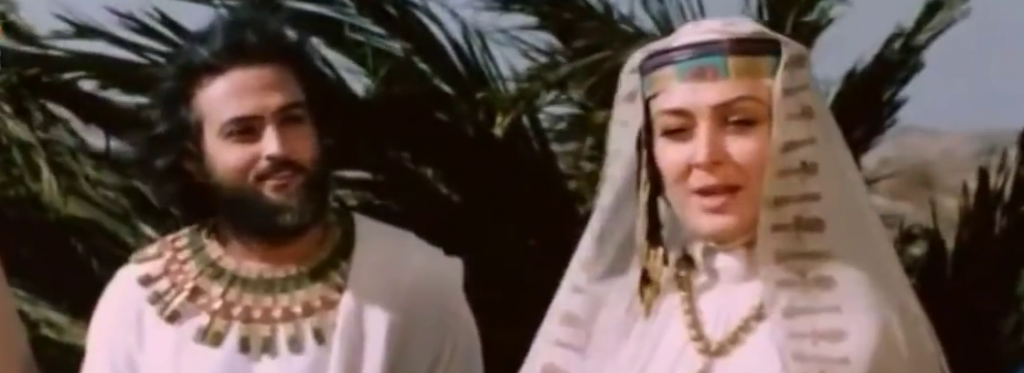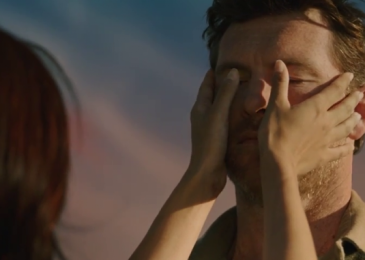Synopsis. Zuleikha has let go of all her guards and most of her servants, so some of the remaining ones begin to steal her jewelry and her dishes. Zuleikha decides that she can be as generous as Joseph, so she goes to the servants’ quarters and announces to the remaining staff that she will give them land and freedom. Meanwhile, the priests of Amon discover that their grain has gone bad and is riddled with pests. They try to dump the wheat in the river at night, when no one can see them, but they are spotted by the guards and exposed by the palace staff. The Pharaoh summons Joseph, who is currently overseeing grain silos in Memphis, back to Thebes. A crowd greets Joseph when he arrives, and Joseph doesn’t notice that Zuleikha herself is in the crowd.
As the 32nd episode begins, Joseph is greeted by the Pharaoh Akhenaten and his wife Nefertiti, who declare that Joseph must marry Asenath, the daughter of a monk who serves the one true God. Joseph obeys their order. Joseph begins to have dreams in which a woman cries for help outside his door but he cannot see her face. Zuleikha becomes even more lonely when her faithful servant Karimama passes away, and more thieves raid her palace when she attends her servant’s funeral. Joseph’s wife Asenath gives birth to a girl, and Joseph names their daughter Manasseh. Far away in Canaan, Jacob can sense that Joseph is happy. Back in Egypt, Joseph comes to the Pharaoh’s palace in the middle of the night and predicts that Akhenaten will wake up hungry. This, he says, is a sign that the seven years of famine have now begun.
Differences from Genesis. The biblical Asenath was the daughter of Potiphera, the priest of On or Heliopolis (Genesis 41:45), which was a city closely associated with the sun-gods Ra and Atum; but the Asenath of the series is the daughter of Kanoose, a monk who leads a temple dedicated to the one true God, who has been named after an entirely different sun-god named Aten within this series. The Bible also shows no interest in the question of whether Asenath or her father were monotheists.
Also, the biblical Manasseh was a boy, not a girl; and the biblical Joseph and Asenath had two sons before the famine began (Genesis 41:50-52), whereas the Joseph and Asenath of the series seem to have just the one daughter when it begins.
Muslim tradition. Malek asks Joseph about a bead he is handling as he waits for news about his daughter’s birth. Joseph replies that the name of the “saviour” is inscribed on the bead, and he says that this “saviour” is the one who will fulfill all the prophets’ dreams. Is it safe to assume this is a reference to Mohammed?
Pious Joseph. Once again, the point is made repeatedly that Joseph is concerned for the poor and does not want to elevate himself above them. He does not ride on a litter and he chastises Inarus for bowing to him (and he’s clearly more annoyed by the bowing now than he was before; he even says — perhaps only half-seriously? — that he should whip Inarus to stop him from bowing to him). Asenath remarks that Joseph never eats to fill his stomach, out of solidarity with those who are hungry. And when his daughter is born, Joseph orders his servants to feed the poor in celebration.
When Asenath asks Joseph why he does not try to contact his father, Joseph gives at least two reasons: first, the Egyptians still need him, and a trip to Canaan would consume months of his time; and second — repeating a point that was made in earlier episodes when Joseph was much younger — he does not want his father to learn what Joseph’s brothers did to him and curse them while they are still unrepentant.
Joseph worries that God will punish him for not knowing how to interpret the dream of the woman whose face he cannot see. Asenath assures him that he can interpret dreams, so it must be God’s will that he cannot see the woman’s face.
The supernatural. Jacob can sense Joseph’s happiness from miles away when Joseph’s daughter is born. Later, Joseph predicts that Pharaoh will wake up hungry in the middle of the night, and it comes true — and not only that, but Joseph declares that Pharaoh’s hunger is a sign that the seven years of famine have begun.
God versus the gods. The priests’ wheat has gone bad, and Malek, upon opening the door to their silo and exposing what’s inside, loudly proclaims that the priests have stolen the labour of other people. The crowd that hears Malek say these things curses the priests. The chief priest later grumbles that this is the second time (following the interpretation of Pharaoh’s dreams) that Joseph has embarrassed the priests.
Zuleikha frequently complains that the Egyptian gods don’t speak to her; at one point she compares their silence to that of her servant Karimama, who has just died.
Believably human. Joseph has flashbacks to the death of his mother Rachel (which happened when she gave birth to his brother Benjamin over 30 years ago) while his wife is delivering their daughter and it seems like there might be some complications.
Later, Joseph wishes his father could have been there for the birth of his first child.
Family dynamics. Jacob spends time with Benjamin while the latter is tending to the flock. There also seem to be grandchildren running around Jacob as he sits outside the small home he built for himself when he moved away from his sons.
Egypt. Queen mother Tiye tells her son the Egyptians have been worshiping Amon for 3,000 years. Tiye lived in the 14th century BC, and belief in Amon is attested as far back as perhaps the 27th century BC — which is only 1,300 years earlier.
Akhenaten appears to be ruling from Thebes still. The historical Akhenaten moved his capital city to Akhetaten (now known as Amarna) when he became a monotheist.
Geography. Joseph, speaking to his wife in Memphis, says it would take a month to travel to Canaan to see his father. Google Maps says it would take about 139 hours to get to Jacob’s home in Beersheba from Memphis on foot, so if Joseph or his horse walked 8 hours per day, it would take 18 days to get there. (The journey from Amarna would be about 194 hours, and the journey from Thebes about 250 hours.)
Timeline issues. One of Zuleikha’s servants says she has spent 15 years crying over Joseph. That’s pretty close, though 13 years might be more accurate (he spent eight years in prison and has been working on the famine preparations for five years when Zuleikha’s servant says this). Unless the servant is also including the time Zuleikha spent pining for Joseph before she made her move and Joseph went to prison?
Joseph tells Asenath he hasn’t seen his father in almost 30 years. Twenty-five years would be closer to the truth: he is 35 when he marries Asenath, he was 11 when he was sold to Potiphar, and he may have been one year younger when Malek found him in the well back in Canaan, depending on how long the trip to Egypt took.
The depiction of women. Zuleikha worries constantly that she has become too old for Joseph, who is so young and good-looking; she also worries that he might make fun of her old age if he ever sees her again. Whatever her obsession with Joseph might be, I’m not sure I would call it “love”. And her constant worrying about the age gap does kind of underscore the fact that there is something creepily incestuous about her obsession with a young man who grew up in her house and was almost like a son to her and Potiphar — though no one in this series has quite put it that way yet.
Zuleikha does at least take the positive step of trying to emulate Joseph’s generosity; as she puts it, “Shouldn’t one in love try to look like one’s beloved?”
I do find myself wondering what the significance might be of turning Manasseh from a boy into a girl. (Manasseh is apparently a boy in the Muslim tradition just as he is in the Judeo-Christian tradition.) Say what you will about the treatment of women in Iran, or Islam, or whatever, but Iranian filmmakers have often shown great sympathy for and sensitivity to women, and the joy that Joseph feels over his newborn daughter is remarkable in an ancient cultural setting where you might have expected him to wish for a firstborn son. I’m curious as to what Iranian viewers made of this.
–
Episodes: 1-2 | 3-4 | 5-6 | 7-8 | 9-10 | 11-12 | 13-14 | 15-16 | 17-18 | 19-20 | 21-22 | 23-24 | 25-26 | 27-28 | 29-30 | 31-32 | 33-34 | 35-36 | 37-38 | 39-40 | 41-42 | 43-45
–
The subtitled version of these episodes runs from about 53:36 to 2:24:44 in this video:
[youtube https://www.youtube.com/watch?v=TOaAcJfqn1c?start=3216&feature=oembed&w=500&h=375]
Here are the English-dubbed versions of these episodes:
[youtube https://www.youtube.com/watch?v=jsAWNc10Cf0?feature=oembed&w=500&h=281]
[youtube https://www.youtube.com/watch?v=RmcuUvKruiU?feature=oembed&w=500&h=281]





